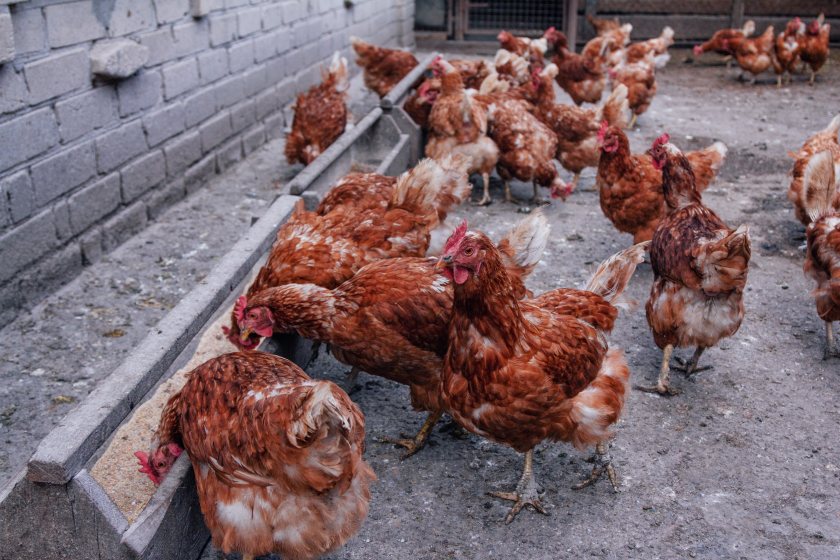
The Northern Ireland Environment Agency (NIEA) has "temporarily paused" some planning applications on farms based on concerns around ammonia levels.
The Department of Agriculture (DAERA) says that NIEA is "considering legal advice on the ongoing application of our ammonia planning standing advice".
The UK's environment watchdog, the Office for Environmental Protection (OEP), is investigating DAERA.
It is the first investigation by the OEP in Northern Ireland, and it will look at the guidance given to farmers and planners on ammonia emissions by the department to see if it breaks environmental law.
The OEP is a new environmental governance body, which holds the government and other public authorities in England and Northern Ireland to account on their environmental protection and improvement.
It advises the government and Northern Ireland Assembly on any changes to environmental law, and has statutory powers to investigate and enforce compliance with environmental law where needed.
Planners processing applications for commercial farms rely on guidance from DAERA about the potential damage to the environment caused by emissions, which is called the Operational Protocol.
Almost all Northern Ireland's current ammonia emissions, 97%, come from agriculture.
The investigation was prompted by several complaints from a member of the public about individual planning decisions that gave rise to the risk of ammonia pollution.
'Unfair and frustrating'
Ulster Farmer Union (UFU) president, David Brown called the development 'completely unfair' for farmers.
"Stagnating farm developments across NI impacts all sectors and farms of all sizes and will have wide reaching implications," he warned.
"Local food production will be hit, especially considering the efforts to tackle the shortage of eggs in Britain.
"To say our farmers are frustrated is an understatement and how they are being treated by NIEA is completely unfair.
"It calls NIEA’s capability into question when their decision to stall on-farm planning applications is due to their failure to agree on an appropriate planning policy to support the reduction of ammonia emissions."
NI high in ammonia
Evidence shows 100% of special areas of conservation, 100% of special protection areas and 99.7% of areas of special scientific interest in Northern Ireland have ammonia concentrations at levels where significant harmful effects will occur.
Natalie Prosser, the OEP's chief executive said: "These relate predominantly to livestock installations and the effect that those livestock installations can have on the ammonia load in relation to those local habitats."
After years of delay, a consultation on a draft ammonia strategy was launched at the start of January 2023.
The draft ammonia strategy includes a target of 30% reduction in ammonia emissions from agriculture and reducing ammonia concentrations at all designated sites by 40% by 2030.
However a Friends of The Earth spokesperson declared the impact of the proposals were 'extremely weak'.
"Our response to the consultation showed that even at its most optimistic, the Department estimates the strategy would only reduce ammonia emissions by about 25%”.
Concerns raised over years
David Brown said the UFU have been raising concerns about the planning process and how ammonia from farms is assessed for many years.
"We have been waiting for revised guidance from the NIEA on this issue since late 2019, outlining our concerns and the need for new guidance to allow farmers to make informed decisions on their farm businesses," he said.
A lack of clarity with current protocol has resulted in several union members having planning applications "sitting in limbo" for several years, he said.
"We understand that a 'call for evidence' on a revised operational protocol is due soon and was unable to be launched earlier due to the purdah period in the run up to the council elections.
"We will engage with DAERA on this and will co-operate with the Office of Environmental Protection during their investigation if our input is required."
'No chance of getting through'
In the UK, Natural England guidelines issued in May 2022 require any planning applications to be below 1% levels in combination with any other facilities within a 10 km radius.
Ian Pick, an agricultural and rural planning consultant, says that in the UK “99% of new planning applications for agricultural production stand no chance of getting through at the moment”, due to the stringent ammonia level restrictions now in place.
He said: “At the moment, with many planning applications, it is anyone’s guess what they will say. The Natural England guidelines are very ridged and ammonia levels are always higher with Free-Range as opposed to Barn rearing”.
“Any planning application within a 5km radius of a site of Special Scientific Interest has no hope”, he added.
